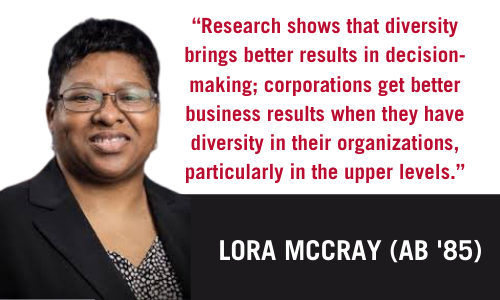Hailing from a small town in southwest Georgia, Lora McCray (AB ’85) arrived at University of Georgia (UGA) in 1981. Education was important to her family, and Lora was a stand-out student, winning a National Merit Scholarship and being recognized with numerous other awards throughout her academic career. Most of her UGA classmates didn’t look like her, and they weren’t from her community, but Lora settled in at Creswell Hall, determined to focus on her studies and to continue to excel.
Keenly interested in social justice and equity issues, Lora followed this passion, majoring in political science, with law school as her post-graduate goal.
“My journey was not a direct line at all – when I was at UGA, I was going to be a lawyer, and I’ve been many different things since then,” McCray reflects.
Lora did achieve the goal of law school, traveling across the country to earn her juris doctorate at the University of Washington. Scholarship support was a deciding factor in her choice of schools. While there, McCray focused on anti-discrimination issues, and she graduated with the desire to work more directly in that area. Lora moved to Washington, DC, passed the Maryland Bar, became a licensed Maryland attorney, and began work with a civil rights consulting firm dealing mostly with Equal Employment Opportunity (EEOC) compliance.
“I [then] got interested in a lot of the things happening around DC at the time – gentrification and other issues with housing,” McCray explains. “I wanted to go back to school and get more education because I thought it was really important that these communities that were being impacted have a voice and a seat at the table. And I wanted to make sure I had the right skills to help with that.”
McCray earned her master’s degree in applied anthropology with a focus on urban development from the University of Memphis. She chose the program because it provided the exact skills and practical training she needed to work on community change issues. The degree reaffirmed her interest in ensuring access to resources and services to people who are often impacted by change, but not given a voice in the process. She accepted a position with Fannie Mae where she first worked in diversity and inclusion programming within the organization and later worked in community lending, creating initiatives that made housing more affordable and accessible to underserved communities (i.e., minorities, women, some religious communities that were not being served by the primary markets). McCray continued her work in affordable housing going from Fannie Mae, to McAuley Institute, a nonprofit focusing on women’s housing issues, to Calvert Investments, and then to the National Association of Realtors (NAR). After directing NAR’s national affordable housing program for several years, McCray was tapped by a former colleague to work as the Assistant Vice President of the Office of Diversity and Inclusion at the Federal Reserve Bank of Boston.
“I was excited about that work because of the lack of diversity in the financial arena,” McCray reflects. “The idea of helping to diversify the Boston Fed and to influence the diversity and inclusion practices of the financial organizations and agencies regulated by the Fed was appealing to me.”
After several years in Boston, McCray eventually went back to DC, where she works in her current role, as Director of the Office of Minority and Women Inclusion at the Consumer Financial Protection Bureau. Her career has taught her that diversity and inclusion is critical to organizations, even if it remains a challenge.
“[In this type of work, you are] always convincing people that this is the right thing to do,” she says. “My agency is 100% committed and supportive, so that does make everything much easier.”

